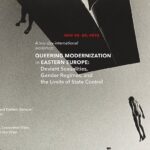 Workshop by the Research Platform „Transformations and Eastern Europe“, Univ. of Vienna (Web)
Workshop by the Research Platform „Transformations and Eastern Europe“, Univ. of Vienna (Web)
Time: 29.-30.06.2023
Venue: Univ. Wien, Universitätsring 1, 1010 Wien, Marietta Blau-Saal
This two-day workshop invites doctoral students and postdoctoral researchers to reflect on the impact that the modernization of states and societies in Central and Eastern Europe (CEE) had on the construction of sexual and gender identities and experiences, as well as the notion of sexual deviance. While the 20th century was marked by increasingly modern – secular, science-based, medicalized, etc. – conception of sexuality across Europe, this new understanding interacted in complex ways with traditional and religious notions of morality and sin. Furthermore, the 20th century in CEE was marked by multiple regime and ideological changes, which also impacted the ways people lived and understood their personal lives, gender identities, and sexual experiences. Considering the limitations of the Foucauldian narrative of the history of sexuality in the West, the workshop invites participants to reflect on the methodological and theoretical tools that are needed to interrogate the continuity and change of sexual discourses and practices in CEE.
Programme (Web)
Panels: Identity, Community, State, and Homosexuality | Socialist Modernity and Sexual Deviance | Literary Escapes and Rebellions
In particular, the workshop invites participants to reflect: Can we see gender as one of the central categories of analysis in understanding the construction of hetero- and cis- normativity and morality, even in societies which prided themselves on achieving gender equality? How do we approach the categories of class and race in relation to sexuality, when talking about CEE region, which experienced modernity largely in its state-socialist form and had a peripheral role in the global history of colonialism and imperial expansion? How did the modernizing institutions of medicine, science, law, police, and other state and non-state actors participate in creating some subject positions as socially acceptable, while others as deviant in CEE countries? In what ways did queer people experience, pursue, and express their desires in modernizing societies, and how can we research, understand, and commemorate them from a contemporary perspective? What can we learn about modern CEE societies and politics when applying queer and feminist theoretical instruments?
Situated within the vibrant field of historical research into non-normative sexualities and genders in CEE, this workshop invites doctoral students and postdoctoral researchers to discuss the newest findings regarding the history of state regulation of deviant sexualities as well as the traces of queer creativity and resistance. It aims to create a platform for a theoretically and conceptually oriented discussion and will result in a publication of a special issue of a peer-reviewed journal.
More info and programme here (Web)
Source: Newsletter des Instituts für Zeitgeschichte
